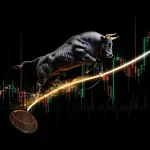Contrarian Definition: Buy When Others Panic
Nov 30, 2024
In the sophisticated and intricate dance of the stock market, contrarian investing stands as a defiant tango against the synchronized waltz of the masses. It’s a philosophy that echoes Nietzsche’s daring call to become who you are, a challenge to the herd mentality that Kierkegaard critiqued with his sharp existential lens. Like Socrates in The Agora, the contrarian investor questions the popular narrative, seeking truths beneath the surface of market euphoria or despair.
This strategy is not merely about being different; it’s about seeking the intrinsic value that Warren Buffett, a disciple of Benjamin Graham’s school of thought, famously championed. It’s about the patience and fortitude to stand firm when the market’s din reaches a fever pitch, reminiscent of George Soros’s bold moves that often ran counter to the prevailing winds.
Contrarian investing is akin to the philosophical journey of self-actualization, where the investor, guided by a compass of rigorous analysis and introspection, seeks out the undervalued and overlooked. It’s a path that requires the stoic resolve that Seneca extolled, the ability to maintain one’s course amidst the storm of market sentiment.
The contrarian’s broad canvas encompasses stocks, bonds, derivatives, and futures, each offering a unique battlefield for the clash between perception and reality. It’s a realm where Charlie Munger’s wit meets the Socratic method. He questions every rally and scrutinizes every crash, searching for the mispriced gems hidden in plain sight.
In the modern era, where information travels at the speed of light and market moods shift with the swiftness of a Twitter storm, the contrarian must be ever-vigilant. The digital Agora is vast, and within it, the contrarian investor must sift through the noise to find the signal, armed with the wisdom of the ages and a keen eye for the ebb and flow of human emotion.
The rewards of contrarian investing can be substantial but not without risks. It’s a high-stakes game that demands courage, discipline, and intellectual humility. For those who can navigate these treacherous waters, the potential gains are not just monetary but also deeply personal, as each successful contrarian bet is a testament to the triumph of independent thought in a world that often rewards conformity.
Modern Contrarian Investing: Evolving Strategies for Dynamic Markets
Contrarian investing has evolved to meet the challenges of today’s complex financial landscape. While the core principle of going against market consensus remains, successful modern contrarians employ a more nuanced approach. They combine deep fundamental analysis with macro trend awareness, seeking high-quality companies that are temporarily undervalued or misunderstood.
Key to this strategy is the ability to distinguish between genuine opportunities and value traps. Modern contrarians must be adept at identifying businesses with solid fundamentals poised for a turnaround rather than those facing irreversible decline.
Patience and discipline are crucial, as undervalued assets may remain so for extended periods. Successful contrarians continually refine their methods, learning from successes and failures to adapt their strategies.
A balance of conviction and humility is essential. While contrarians seek to capitalize on market inefficiencies, they must also recognize when the consensus view may be correct. This requires constantly re-evaluating one’s position and a willingness to adjust when necessary.
Modern contrarian investing aims to generate sustainable alpha through independent, objective thinking. However, achieving this goal now requires a more sophisticated, adaptive approach that can navigate the intricacies of today’s dynamic markets.
AI-Driven Contrarian Investing: A Bold Fusion of Technology and Psychology
In investing, a new breed of contrarians has emerged, armed with artificial intelligence and a deep understanding of behavioural psychology. This modern-day warrior wields data and technology with the guile and strategy of a master tactician. AI is their weapon of choice, harnessing its power to detect subtle market inefficiencies and patterns that elude human analysts.
With AI, they uncover hidden opportunities, moving with calculated precision against the tide of popular opinion. Sentiment analysis of social media and news sources provides insights into the collective psyche, allowing these contrarians to gauge and counter market sentiments with surgical strike accuracy.
Yet, the integration of behavioural psychology truly sets them apart. These investors understand the cognitive biases that drive human decision-making and exploit them with calculated guile. They identify patterns of overreaction and underreaction, allowing these warriors to strike when fear or greed takes hold of the market’s psyche.
This fusion of technology and psychology is a powerful alliance, a dynamic duo of the investing world. It represents a new frontier, a data-driven evolution of contrarian investing, where the battle is fought with algorithms and psychological insights.
Contrarian Investing and Mass Psychology: Navigating Market Sentiment with Strategic Guile
For contrarian investors, investing is a strategic dance, a delicate balance between going against the tide and harnessing the power of crowd behaviour. Success lies in understanding the masses, recognizing when their emotions reach fever pitch, and then making a move with calculated boldness.
These investors are not merely contrarians for the sake of being different. They are mass psychology students studying the crowd’s behaviour with the keen eye of a general surveying the battlefield. They recognize that the masses can be driven by fear and greed, and they use this knowledge to their advantage, navigating the ebb and flow of market sentiment with finesse.
These contrarians have evolved their tactics in today’s fast-paced, tech-driven world. They harness real-time data and advanced analytics, monitoring social media and news sentiment with the same vigour as traditional market indicators. It is a marriage of old and new, blending time-tested principles with cutting-edge tools.
Behavioural finance research provides them with a psychological arsenal, offering insights into the biases that influence investor decisions. With this knowledge, they navigate the emotional swells of the market, capitalizing on mispriced assets left in the wake of the crowd’s frenzied rush.
By integrating mass psychology into their contrarian approach, these investors gain a nuanced understanding of market dynamics. This allows them to make informed, profitable decisions while avoiding the pitfalls of herd mentality. They are the modern-day warriors of the financial world, and their strategies are a delicate blend of boldness and elegance.
Refining Success Through Contrarian Strategy
To master contrarian thinking is to embrace a strategy that underpins much of Warren Buffett’s investment success—a keenness to zag when others zig. Here’s a distilled guide to cultivating a contrarian mindset for success:
1. Challenge the Norm: Adopt a Socratic approach to question the commonplace. Why are things done a certain way? Explore alternatives, unearth biases, and strive for a deeper understanding to inform your decisions.
2. Embrace Diverse Viewpoints: Actively seek out different opinions, whether from experts, peers, or customers. Valuing a spectrum of insights can sharpen your decision-making and foster a culture that prizes intellectual diversity.
3. Weigh Risks Against Potential Rewards: Like Buffett’s careful investment analysis, perform a meticulous cost-benefit evaluation. Understand the risk-reward balance and consider the long-term implications of your decisions.
4. Cultivate Openness and Risk Tolerance: Be receptive to novel ideas and ready for change, much like Buffett when he spots an undervalued company. Taking calculated risks can lead to significant breakthroughs.
Contrarian thinking is not just a tactic but a comprehensive approach that involves critical analysis, openness to diverse insights, and a balanced assessment of risks and rewards. It’s a pathway to innovation and success, charting a course that often leads against the current but towards new horizons of achievement.
Conclusion: The Contrarian’s Creed – A Bold Precision and Unyielding Vision
Contrarian investing is not merely a strategy; it is a philosophy forged in the crucible of scepticism and sharpened by strategic insight. It is the art of seeing value where others see chaos, of discerning opportunity in the overlooked and undervalued. This is not a path for the faint-hearted—it demands the courage to challenge the consensus and the wisdom to navigate the stormy seas of market sentiment with precision and poise.
The contrarian embodies the scepticism of a philosopher, questioning the herd’s assumptions with unrelenting rigour. They do not oppose the crowd for the sake of rebellion but for the pursuit of truth—truth hidden beneath the noise of popular opinion. Like a strategist on the battlefield, they move with calculated intent, exploiting the irrationality of the masses to uncover opportunities others are too blind or fearful to see.
This philosophy is not confined to stocks or bonds; it is a way of thinking transcending asset classes. It is a discipline that demands stoic patience in the face of volatility and the analytical prowess to separate signal from noise. The contrarian investor is a modern-day warrior, blending intellect with intuition, wielding data as their weapon and psychology as their shield.
Incorporating Crowd psychology into their arsenal, contrarians observe the emotional tides of the market, waiting for moments of extreme fear or greed to strike. They exploit cognitive biases with surgical precision, making the crowd’s irrationality their advantage. This is not guesswork but a calculated dance of intellect and instinct, a fusion of behavioural science and financial acumen.
Ultimately, contrarian investing is a call to arms for those who dare to defy convention. It is a creed that demands boldness, discipline, and an unyielding belief in one’s ability to see beyond the surface. It is not about following the market’s whims but about forging one’s financial destiny with the precision of a strategist and the vision of a philosopher. For those willing to embrace this path, the rewards are not just economic—they are the triumph of intellect over emotion, of courage over conformity, and of vision over the ordinary..
Past Issues of Tactical Investor Articles
Historical Archive of Tactical Investor Articles













